The Hideyo Noguchi Africa Prize 2013 - PRESS RELEASE -
The government of Japan has decided to award the Second Hideyo Noguchi Africa Prize to Dr. Peter PIOT (Belgium) and Dr. Alex Godwin COUTINHO (Uganda).
Medical Research
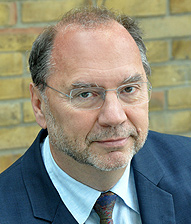 Dr. Peter PIOT, Born in Belgium in 1949. Obtained M.D. at University of Ghent, and Ph.D. (Microbiology) at University of Antwerp. Current Director and Professor of the London School of Hygiene and Tropical Medicine.
Dr. Peter PIOT, Born in Belgium in 1949. Obtained M.D. at University of Ghent, and Ph.D. (Microbiology) at University of Antwerp. Current Director and Professor of the London School of Hygiene and Tropical Medicine.
The Second Hideyo Noguchi Africa Prize for Medical Research goes to Dr. Peter Piot for his pivotal research on diseases endemic to much of the African continent, including HIV, Ebola, chlamydia, tuberculosis and gonorrhea.
Personifying an unusual combination of research on the ground in multiple African locations and worldwide policy strategy, Professor Piot has applied his scientific discoveries and insights to people all over the world, especially in Africa.
Beginning in 1976, Dr. Piot, then at the Institute for Tropical Medicine in Antwerp, Belgium, devoted indefatigable energies to the epidemiology, virology and clinical analysis of diseases of devastating impact in Africa, and dedicated years of his life to research and training all over the continent.
Dr. Piot was part of the team that discovered Ebola in Zaire (currently the Democratic Republic of the Congo) in 1976, and among the first to confirm the presence of heterosexually transmitted HIV and pediatric AIDS in Africa, as well as the association between HIV infection and tuberculosis in Africa.
Through his prominently published scientific papers, and powerful role on the global stage, Dr. Piot has brought the HIV pandemic to the forefront of global attention and concern, raised international commitments to its funding and control, and built scientifically grounded responses to the control and treatment of the disease.
Summary of Achievements
Pioneering research work on the scene
Dr. Peter Piot made various contributions to the prevention and control of infectious diseases in Africa, by leading international research teams and carrying out fieldwork.
When the first known outbreak of Ebola hemorrhagic fever occurred in Yambuku, Zaire, in 1976, Dr. Piot and his colleagues identified a new filamentous Marburg-related virus in blood samples sent to the Microbiology Department of the Institute of Tropical Medicine in Antwerp. He then became the director of operations of the first international team carrying out fieldwork in the Yambuku area, and provided the first clinical description and epidemiological features based on his work on the scene. This first investigation provided the foundation for controlling subsequent Ebola and hemorrhagic fever outbreaks in Africa.
Together with Kenyan and Canadian colleagues, Dr. Piot started a research team on Sexually Transmitted Infections (STI) in Nairobi, Kenya, in the early 1980s. His team focused on infectious diseases in both mother and child. Their work led to a new understanding of the importance of the control of STI for the health of mother and child, and also led to the development of new interventions. The results have been incorporated into WHO prevention and clinical management guidelines still widely used in Africa and beyond.
In 1983, Dr. Piot led a research team in Kinshasa which revealed a major, till-then undocumented, heterosexual AIDS epidemic in Central Africa, leading to a landmark publication in The Lancet in 1984. He co-founded the first international research program on HIV/AIDS in Africa, and generated the basics of our knowledge on the epidemiology and clinical expression of HIV infection.
Dr. Piot’s collaborative studies in Nairobi and Kinshasa elucidated particular biological and behavioral risk determinants of heterosexual transmission, and were the first to suggest a protective effect of male circumcision against HIV infection, which was later proven in a randomized trial and is now implemented in several countries. His research teams also conducted the early studies defining the rate of mother-to-child transmission of HIV and associated risk factors, and reported on the first successful preventative interventions against the spread of HIV among high-risk populations in Africa. His laboratory isolated highly divergent strains of HIV-1 from Africa, identified simian immunodeficiency viruses in chimpanzees (SIVcpz), and documented the wide genetic diversity of HIV-1 in Africa.
Dr. Piot and his team were the first to recognize the importance of HIV/Tuberculosis (TB) co-infection in Africa. TB is now the major killer of HIV-positive individuals in Africa. They demonstrated that standard treatment regimens for TB in Africa were ineffective in patients co-infected with HIV, and described the distinct clinical manifestations and diagnostic features of HIV/TB coinfection. Their work led to developing new clinical management and treatment guidelines for TB in Africa.
Since the 1990s, Dr. Piot has been serving as a global leader in the health field of the United Nations, WHO, etc. He played an active role in developing an international funding mechanism for the fight against AIDS, TB and Malaria (the Global Fund). His work contributed significantly to the decline of mortality due to AIDS and of new HIV infections in Africa.
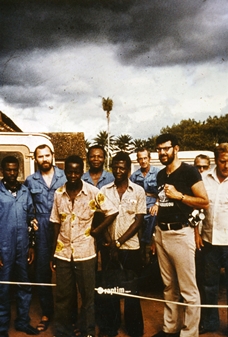
International team arriving in Yambuku, Zaire to investigate Ebola Outbreak, 20 Oct 1976
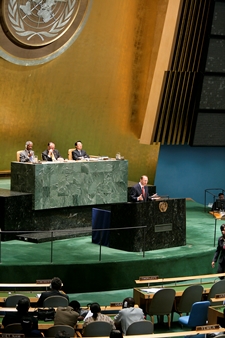
Addressing UN General Assembly in 2005 (UN AIDS photo)
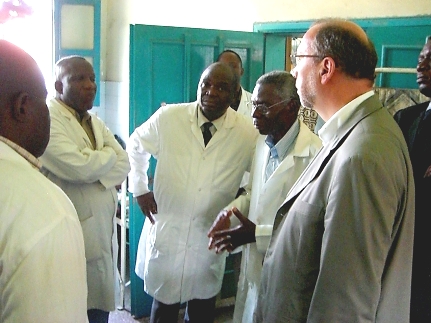
Dr. Kapita and Colleagues at the Hospital of Kinshasa
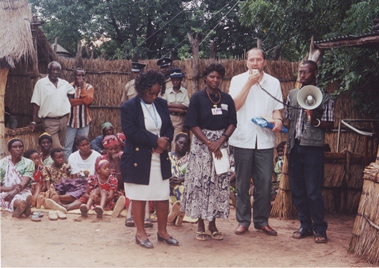
Addressing Community in Livingston, Zambia
